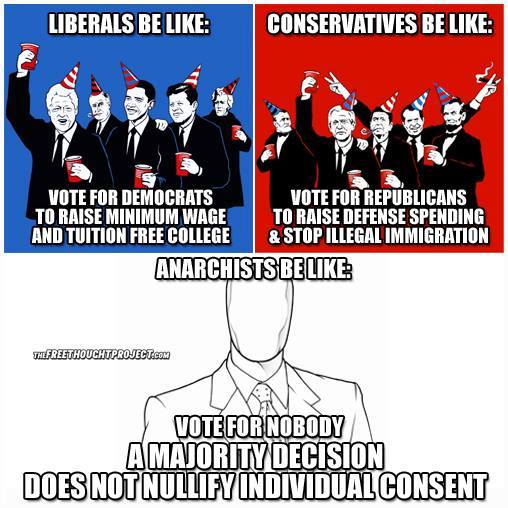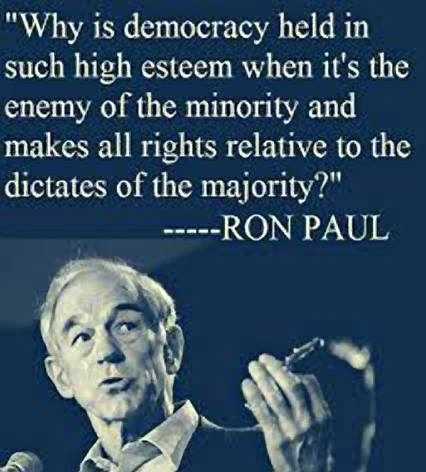The following debate originally took place upon my Facebook wall, after I posted artwork being shared by the page, “Liberty Memes”…
Rayn:

“Rage on behalf of the machine”
Sam B.:

“When you’re a high school college age middle class white male who grossly overestimaes his knowledge of philosophy, politics and economics”
Rayn: To whom are you referring?
Sam B.: “Volunteerists” are basically AnCaps, soooo
Rayn: Hmmm… How ironic… A dismissive, condescending, fact-free claim that I “grossly overestimate” my “knowledge of philosophy, politics, and economics”… delivered in the form of a vague, confusing, clumsy, poorly-worded, grasping accusation… that just so happens to showcase the exact flaw I’m alleged to have. Keep it class-y, comrade! 😉
To be clear: the term is “Voluntaryist,” not “volunteerist.” And, at the root of the word “Voluntaryist,” along with the entire foundation of the philosophy it enshrines, is the concept of “voluntary” action. This is readily distinguishable from the unrelated act of being a “volunteer.” Your failure to make this distinction is only my *first* indication that *you* “grossly overestimate” your own “knowledge of philosophy, politics, and economics” – not to mention, anti-politics, too.
My second indication comes from your failure to distinguish between Voluntaryism and Anarcho-Capitalism. By definition, Voluntaryism is simply the “philosophy which holds that all forms of human association should be voluntary.” Voluntaryists view and treat *consent* as the foundation of a peaceful, just society – nothing more. Voluntaryism is a bare-boned social-moral philosophy – not a specific political-economic blueprint. Hence, one can both be a Voluntaryist AND practice, for example, Anarcho-Communalism (or, Anarcho-Feminism, or Anarcho-Primitivism, etc) – so long as the particular type of activity or system being practiced is based in *voluntary action*, rather than *coercion*.
Meanwhile, Anarcho-Capitalists are defined as those that “advocate the elimination of the state in favor of self-ownership, private property and free markets.” This clearly maps out a political-economic system. Indeed, Voluntaryism, like many other types of types of Anarchism, is predicated upon the principle of universal self-ownership (and, the somewhat-related, yet still separate, Non-Aggression Principle), but this is the only fundamental agreement between Voluntaryism and Anarcho-Capitalism. Perhaps this article will help to clear things up for you…
Voluntaryism Versus Anarcho-Capitalism:
In the end, your obtuse claim that Voluntaryists are “basically AnCaps,” is unsupported by fact, and really only serves to expose your prejudice. So, I’ll share a few of my personal views, to assist you in shedding some of your preconceived, false notions. I am a Voluntaryist, NOT an Anarcho-Capitalist. And, this is for a number of reasons – starting with the most basic concept of “property rights.” More than a few Anarcho-Capitalists lean on a Western understanding of property rights, which calls for the creation of artificial borders, through tools like title-ship and fences, without even a single regard for actual personal use, involved. I view this as a breach of the peace, because such systems restrict the free travel of the peaceful. And, even worse, Western-style property rights are often inherently hostile to the well-established travel routes, hunting grounds, and natural water supply locations of Stateless nomadic/tribal/indigenous societies, as well as the local animal populations, making them a further breach of the peace. Compounding the issue, these Western-style property rights typically call for the designation of all those who travel through said artificially-created borders as criminal “trespassers,” regardless of actual personal use of the “owner,” and without consideration for each individual traveler’s peaceful activity during transit (i.e. no harm, no property destruction, no dumping of waste, etc.). And, this apparently allows for the initiation of violence against said “trespassers.” I view the logic and motivations for such a crude understanding of land “ownership” to be fundamentally flawed. As a Voluntaryist, my property rights extend not from entitlement, nor even through mere occupation of physical space, but from the basic principle of Self-Ownership, and my desire to peacefully continue exercising my Individual Sovereignty, without interference, even as I respect that exact same right among all other members of the living, beginning with my fellow human beings, in an effort to cooperatively co-exist, and guard our birthright, together.
Rayn: As a Voluntaryist, I advocate for the use of any and ALL Voluntary-based economic systems, ALL of the time – based on each and every individual situation and circumstance, involved. You might do well to think of it more as a “spectrum,” with an Individual free to navigate it, at their own discretion. Meanwhile, if you’ve ever taken the time to talk to an Anarcho-Capitalist about their economic views, they will rarely advocate for such liberties. As an Individual, I engage in a more Anarcho-Communalist economic system within my own household, and in my family unit. Yet, as a matter of *pure personal preference*, I absolutely do advocate for free markets, free trade, and free enterprise – the laissez-faire approach – in my voluntary dealings with society, at large. However, in even this seemingly “basic” respect, I still find myself fundamentally at odds with many Anarcho-Capitalists, yet again. And, this conflict arises, for one, because I dare view corporations exactly as the vast majority of us Anarchists view the government – as representing nothing more than corrupt pieces of legal fiction, which essentially function as protective Straw-men, by *limiting the personal liability* of those humans who operate them, while maximizing their personal profitability. In a free society, without government, I would “advocate the elimination” of all corporations, and seek to have them rightfully recognized as just another form of business fraud. Make no mistake: I fully respect freedom of association, and do not condemn partnerships in business or organization, as they more-appropriately “spread” liability. I just take issue with the formation of corporations, which represent an attempt to “buffer” liability onto a fictitious entity, rather than the real-life, flesh-and-blood human beings operating them.
Aside from this, my understanding of the laissez-faire approach is also at odds with a number of Anarcho-Capitalists for another important reason – that once again traces back to property rights. A number of them do not agree with my apparently-more-inclusive understanding of “free markets, free trade, and free enterprise,” because they lean on the Western-based concept of “intellectual property,” which calls for the physical enforcement of “copyrights” and “patents.” Some even go so far as to claim free-sharing of music and art as a form of theft. Meanwhile, I advocate for the elimination of all such systems because I view them as crushingly oppressive and sinister attempts to restrict the free market and free trade of ideas, thoughts and concepts, in a protectionist racket against free enterprise. It is also inherently hostile to open-source and crowd-sourced-based works, too. In my estimation, all so-called “intellectual property” actually enters the “public domain” from the moment it is published – end of story. Indeed, authors deserve recognition for their original ideas, thoughts and concepts. And… that’s about as far as that goes. So long as an individual isn’t plagiarizing an original author, nor fraudulently claiming the original author’s name as their own, in duplicating ideas and concepts, there is no injured party to speak of. And, I say this is as a musician, an artist, and a writer, offering my work, at no charge, under Creative Commons
On a final note, I should point out that capitalism, itself, is defined as “an economic and political system in which a country’s trade and industry are controlled by private owners for *profit,* rather than by the state.” Furthermore, the root word of capitalism, which is “capital,” refers specifically to physical wealth. Under these terms, there is simply no way for me to identify myself as any sort of “capitalist.” To begin, as an Individual, I’m primarily motivated by my desire to keep my eternal soul – and, it’s not for sale. Besides this, as a Voluntaryist, I’m motivated, first and foremost, by my desire to keep my free will – and, once again: it’s not for sale. Personally, I have no intention of trading off either of these sacred possessions, for any amount of fleeting “profit” in this world of temporary substance.
In the end, the narrow definition of “profit,” as offered by capitalism, is severely lacking in depth, by design – since it is driven by the dry math of business-building. With this in mind, capitalism actually offers *one* particular mode of motivation for exchange within the free market, among many other competing and cooperating motivations. Yet, there are plenty of Individuals only interested in building up a business when they first create it, and who cease expanding, once they achieve a comfortably modest, self-manageable size level of production. And, besides this, it is possible for a business to even technically “profit” without surplus “accumulation of capital”. An easy hypothetical example of this would be a recycling company that operates successfully, while only breaking even, financially. Land and soil conservation represent legitimate factors to consider in the realm of real, sustainable, long-term profit, even when the average, short-sighted Capitalist willfully excludes them, choosing to focus on “accumulation of capital,” as the sole measure of successful operation, using their steady accumulation of profit to buffer themselves from the consequences of unsustainable environmental practices – ready to jump ship on the land they ruin, and purchase new property, basically. And, this leads me to my final point, which is that there are many other forms of profit beyond just physical wealth – and they individually, and cooperatively, exercise various levels of influence over the free market, free trade, and free enterprise, as well. An quick example of this sort of profit would be “accumulation of reputation,” as dictated by quality of character, which, in itself, acts as a form of social currency.
Rayn: By the way… in case you haven’t taken the time to notice… I’m not a “high school to college age middle class white male.” And, in fact, I’ve spent most of my life in poverty, and I was also homeless with my family in NYC for almost four years, straight, starting at 12 years old… “soooo”…













